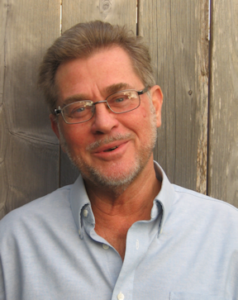 Jack Butler’s novel Living in Little Rock with Miss Little Rock was nominated for a Pulitzer Prize. His poems, short stories and other writings have been published in The New Yorker, Atlantic, and New York Times Book Review, Poetry, Southern Poetry Review and other publications. Mud Flat Press is proud to have published his Practicing Zen Without a Licence (spelled in the British and American manner in the book, Licence and License) and his short story “Emmolene’s Bones.”
Jack Butler’s novel Living in Little Rock with Miss Little Rock was nominated for a Pulitzer Prize. His poems, short stories and other writings have been published in The New Yorker, Atlantic, and New York Times Book Review, Poetry, Southern Poetry Review and other publications. Mud Flat Press is proud to have published his Practicing Zen Without a Licence (spelled in the British and American manner in the book, Licence and License) and his short story “Emmolene’s Bones.”
Mud Flat Press: Practicing Zen Without a License appears to be an anthology of writings on zen by various practitioners and philosophers, but nobody, it seems, has ever heard of any of them. So what’s up with that?
Jack Butler: Let me come right out and admit that nobody has heard of any of these people for the very good reason that this is a 25th-century manual of a form of zen which only took over late in the 21st century, and that most of the people the people in the 25th century revere for zen practices were ignored because they were seen at best as oddballs and at worst as Democrats.
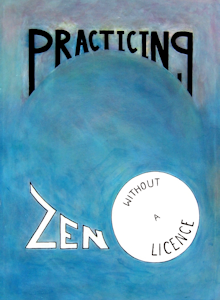 If anyone wishes to bring up that tired old quibble as to how an author from this century could obtain a 25th-century version of what was, really, not exactly a book, though it has a similar function . . . What I mean is, my patience has worn thin, and I refuse to answer questions on that topic any more. You might as well accuse me of simply making it all up.
If anyone wishes to bring up that tired old quibble as to how an author from this century could obtain a 25th-century version of what was, really, not exactly a book, though it has a similar function . . . What I mean is, my patience has worn thin, and I refuse to answer questions on that topic any more. You might as well accuse me of simply making it all up.
MFP: Some of the philosophers and/or zen masters quoted throughout the book have names that sound like word play, such as Chu Chu, Phil the Philosophical, Wan Shu and Wuan Shaboom. Care to comment on those names?
JB: As for the names of the characters—those are their zen names, the names by which they are known to posterity. As for us (and by us, I mean the 25th century), those are the only names by which we will ever know them. We can never know their birth names.
Which is another reason nobody has ever heard of them, of course.
MFP: Can we trust anything in the book to be true? The cover blurb, for instance, says you are “somewhat less than 400 years old” and the son of a Baptist preacher from Alligator, Mississippi.” True or false? In fact, we’ve heard that you, yourself, were once a Baptist preacher.
JB: Well, I don’t know what others trust or don’t trust, but I am, in fact, somewhat less than 400 years old, am the son of a Baptist preacher from Alligator, Mississippi, and was, once, briefly, a Southern Baptist preacher. I can’t imagine I was a good one. (There are times when I can’t imagine that any Southern Baptist preacher is a good one, but that is probably a sinful thought caused by my own irreverence.)
MFP: There is one chapter buried deep within the book called “Southern Baptist Zen” which seems to be autobiography. Is it?
JB: I agree that “Southern Baptist Zen” is autobiographical, but the question is whose autobiography? Is it mine, or is it the voice of the real Anonymous, Anonymous Anonymous? You seem to feel, for reasons of your own, that it might be mine. But isn’t that tantamount to suggesting the writer puts part of himself or herself into the writing, either as the shape of the happenings or the behavior of the characters or the mood of the whole? That’s a whole slippery-slope thing there that I think we want to carefully walk away from, if you know what I mean.
There are oddities beyond these, even, but we must remember, when we come to a tone or level of speech we don’t understand or the fact that certain koans strongly resemble old hairy-dog jokes, that these are the people of the 25th century, and this is how they, well, write, or whatever it is, and it’s how they see things, and it’s not gonna be just plain vanilla samo samo.
MFP: Sense of place seems to be a big deal with Southern writers who, perhaps more than writers from other parts of the world, tend to write about where they live. Faulkner’s Yoknapatawpha County, Pat Conroy’s Tidewater. But you are all over the map with books set in Jackson, Mississippi; Little Rock, Arkansas; Santa Fe, New Mexico; and even on the surface of Mars. And they ricochet through many genres from the story of a teenage jujitsu instructor to a dream study involving artificial intelligence to politics and even to a cookbook and a vampire story, and yet some of the same characters and themes pop up in all your books. Is there some connecting thread or overriding theme?
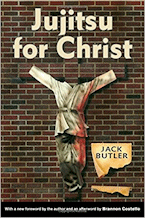 JB: Actually I have one of those Yoknapatawpha County things too. Mine is based somewhat on where I lived when I was a kid, which was in Delta Mississippi and deep into reading—including science fiction—and my imagination, hiding there against what seemed to me the absolutely funless, mean, self-righteous, and hypocritical “actual” place I grew up. I was born to a planter family, but early on my father (I suspect for love of my mother) became a Southern Baptist, which, in the Delta was a hard-bitten and poor group of people to whom Jesus seemed to me to mean only violence, blood, sin, and sacrifice.
JB: Actually I have one of those Yoknapatawpha County things too. Mine is based somewhat on where I lived when I was a kid, which was in Delta Mississippi and deep into reading—including science fiction—and my imagination, hiding there against what seemed to me the absolutely funless, mean, self-righteous, and hypocritical “actual” place I grew up. I was born to a planter family, but early on my father (I suspect for love of my mother) became a Southern Baptist, which, in the Delta was a hard-bitten and poor group of people to whom Jesus seemed to me to mean only violence, blood, sin, and sacrifice.
In other words, mine is based in the multiverse—an even more commodious version than the quantum mechanical multiverse theorized by many scientists (and science fiction writers), since it included fiction and dream as well as “parallel universes”—”parallel” is a very misleading word. They should actually be thought of as diverging worlds. According to the quantum mechanical physicists a new and different universe branches off from each quantum-level choice (I won’t go into the physics, for which you can be thankful. Except to say that actually one’s entire life, according to that interpretation of quantum mechanics, is a series of such branching moments, since it is a series of such choices. It is impossible to say which “life” you are branching “from,” since one’s life is made up of the choices, and there is no moment in any life in which such choices are not continually being made.)
If you think the universe is big—and it is, inconceivably vast—imagine how big the multiverse must be. And “my” multiverse is even bigger, remember.
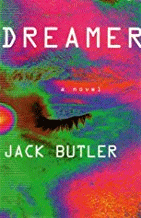 So characters in one of my books or stories may appear in others, or may even be the “author” of some of my books in other cases. For example, Jody Nightwood, the main character in Dreamer, appears in Practicing Zen without a Licence as one of the legendary masters of the past. To some degree, PZ covers her later history, after the events in Dreamer. Wingo, the mad mathematician provides the epigraph for Nightshade, and is a character of some importance both in a projected novel I have not yet written, and in my in-progress novel, The Illumination of Elijah Lee Roswell. Marcus Gandy, the putative author of Jujitsu for Christ, is also be the author of Illumination, and so on. In this way, I intend a connection between all my books, connections that can also be pieced together to intuit the stories of people whose stories are not told outright, what I call, on the model of electromagnetic wave/particles, “interference” stories. John Shade, the vampire in Nightshade, appears in Dreamer—200-odd years earlier—and he is never described as a vampire. One only knows this if one has read Nightshade. But if you do know it, it adds levels to his behavior, his meaning. This is another benefit of my fictional multiverse. I can deepen characters (for readers in the know) between novels, as it were. In fact, there are two other characters in Dreamer who first appeared in Nightshade (set, as I say, 200 or so years later). One of them I will leave to you to discover. The other is the artificial intelligence Mandrake, who has just been created in Dreamer, but in Nightshade is one of the ancient artificial intelligences who terraformed Mars (or at least a couple of craters on Mars). I want to say, though it has nothing to do with this interview, that I predicted back in 1989 the way the movies would be going in the future, and predicted huge reservoirs of underground water on Mars—and added a word to the language, I think. Nobody was using “burn” to speak of making a copy of a computer disk in 1989, but I used it in a very similar sense in the novel, and it has since become ubiquitous.
So characters in one of my books or stories may appear in others, or may even be the “author” of some of my books in other cases. For example, Jody Nightwood, the main character in Dreamer, appears in Practicing Zen without a Licence as one of the legendary masters of the past. To some degree, PZ covers her later history, after the events in Dreamer. Wingo, the mad mathematician provides the epigraph for Nightshade, and is a character of some importance both in a projected novel I have not yet written, and in my in-progress novel, The Illumination of Elijah Lee Roswell. Marcus Gandy, the putative author of Jujitsu for Christ, is also be the author of Illumination, and so on. In this way, I intend a connection between all my books, connections that can also be pieced together to intuit the stories of people whose stories are not told outright, what I call, on the model of electromagnetic wave/particles, “interference” stories. John Shade, the vampire in Nightshade, appears in Dreamer—200-odd years earlier—and he is never described as a vampire. One only knows this if one has read Nightshade. But if you do know it, it adds levels to his behavior, his meaning. This is another benefit of my fictional multiverse. I can deepen characters (for readers in the know) between novels, as it were. In fact, there are two other characters in Dreamer who first appeared in Nightshade (set, as I say, 200 or so years later). One of them I will leave to you to discover. The other is the artificial intelligence Mandrake, who has just been created in Dreamer, but in Nightshade is one of the ancient artificial intelligences who terraformed Mars (or at least a couple of craters on Mars). I want to say, though it has nothing to do with this interview, that I predicted back in 1989 the way the movies would be going in the future, and predicted huge reservoirs of underground water on Mars—and added a word to the language, I think. Nobody was using “burn” to speak of making a copy of a computer disk in 1989, but I used it in a very similar sense in the novel, and it has since become ubiquitous.
May not have anything to do with me, of course. But I like to think so.
The question, now that I am much closer to 400 years old than I was went I wrote JJC, is whether I will live long enough to make the connections obvious enough to enough readers. (They should at least be fun hints.) I chose this “fictional countryside” because it seemed complex enough to make some sense, or at least some stories out of the irreducible and apparently frequently contradictory nature of life and our various attempted theories, explanations, and theologies. Also because, since incompletion is built into the very model, it won’t matter that much what I fail to get written. I will not be forcing my characters into some sort of temporal and “real” scene of the plot. I can die anytime, and the model, always incomplete, will not be more incomplete.
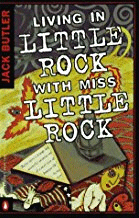 Also to have some fun. I love to have fun, to laugh, and that is true even of the biggest questions and example. Nothing is safe from laughter. The very desire to be safe from laughter seems to me tyrannical.
Also to have some fun. I love to have fun, to laugh, and that is true even of the biggest questions and example. Nothing is safe from laughter. The very desire to be safe from laughter seems to me tyrannical.
To speak, just for a moment, of contemporary politics, and the possible destruction of our union: I wrote, in JJC, some 32 years ago (or had Marcus Gandy write) “America is Mississippi now. You don’t believe me. You wrong.” It is impossible, for someone who came of age during the Civil Rights era in Mississippi, not to think—with that obscene clown in the White House, and his core cadre of voters who are willing to ignore (or practice) hypocrisy, outright lies, racist, misogyny, and other sorts of bigotry, Nazism, science and fact-denial, and the utter perversion of what Jesus says in the New Testament—that America is not Mississippi now. You tell me it isn’t. I hear the same execrable language, see the same hideous behavior, that I experienced back then. The supposed governors of the country are corrupt and insane.
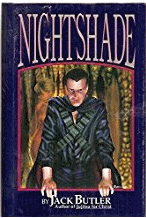 (And if someone reading this is a member of that cadre, and I have offended you here, that’s okay with me. I don’t want those people, not the deplorables, but the despicables, as readers. Christ also said he came as a sword. Listen, I’m as susceptible as anyone to pleas for the especial value of “the Southern Way of Life,” especially the close relation to nature; but when your way of life entails a racist society, if you do not face that fact and attempt to do something about it, you have failed a major moral test. You do not get to keep your “way of life,” and yet object to being thought racist. There are some offenses that are so hideous that it does not matter how kind and loving you are among your own; the offense you allow overwhelms any personal virtue. Hitler apparently loved animals. Does that cause us to forgive him?
(And if someone reading this is a member of that cadre, and I have offended you here, that’s okay with me. I don’t want those people, not the deplorables, but the despicables, as readers. Christ also said he came as a sword. Listen, I’m as susceptible as anyone to pleas for the especial value of “the Southern Way of Life,” especially the close relation to nature; but when your way of life entails a racist society, if you do not face that fact and attempt to do something about it, you have failed a major moral test. You do not get to keep your “way of life,” and yet object to being thought racist. There are some offenses that are so hideous that it does not matter how kind and loving you are among your own; the offense you allow overwhelms any personal virtue. Hitler apparently loved animals. Does that cause us to forgive him?
I also put real people into some of my stories. “Jack Butler” is mentioned as a minor and forgotten poet of the 20th century in Nightshade, appears as a walk-on character in one chapter of Living in Little Rock with Miss Little Rock. “Freddy Dallas” and “Alvaro on the 12-string guitar” are lightly based on real people, somewhat (but not much) disguised.
As early on as my first novel, JJC, I understood that I had been given a subject (racism and its cruelties and absurdities, and the way it destroyed all faith in the culture it controls), but that I could not base all my novels on racism, that that would be dishonest, would be using racism for my own profit, that I had basically said what I had to say about it in JJC, but that if I was to write other novels, they had to be different. (There is nevertheless, I hope, a certain fiery advocacy of the downtrodden, the children, the innocent victims in all my works.)
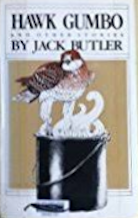 There are hints of my fictional “multiverse” even in that first book. Marcus (not yet recognized as the author), declares that he was meant to be a science fiction writer, not a writer of “lyrachur.” He declares that his next book will be about vampires on Mars. Well, my second novel, Nightshade, is about a vampire on Mars, but still.
There are hints of my fictional “multiverse” even in that first book. Marcus (not yet recognized as the author), declares that he was meant to be a science fiction writer, not a writer of “lyrachur.” He declares that his next book will be about vampires on Mars. Well, my second novel, Nightshade, is about a vampire on Mars, but still.
In my multiverse, Marcus is actually the author of all my books. “Jack Butler” is a character written by Marcus, based on someone who annoyed him in writers’ workshop. He uses “Jack Butler” as his pen name for all his “literary” books (a sort of private self-deprecatory joke), his own name, Marcus Gandy, as the author of his science fiction books, and J. D. Rider (a character in LLR, a sort of detective) as the pen-name for his mysteries.
This pretty well covers the field of my literary and pop reading, which is handy. I see “literature” as a genre, by the way, along with science fiction and mystery and western novels and horror novels and romance novels and so on. It does not seem to have dawned on the poobahs of literature that someone might come along who treats “literature” as a genre in itself, and uses it for tone in his or her pop novels.
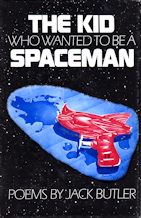 I see the first four novels, all expressly by “Jack Butler,” as Marcus trying to figure things out and not yet coming to his full realization of the scheme he would use, so using the pen name Jack Butler for all his books. See how handy the multiverse is?
I see the first four novels, all expressly by “Jack Butler,” as Marcus trying to figure things out and not yet coming to his full realization of the scheme he would use, so using the pen name Jack Butler for all his books. See how handy the multiverse is?
Another reason for this fictional world (the multiverse) is that when I was growing up, and indeed, until very recently, literary novels largely ignored science and mathematics (or demonized them if they were mentioned—literature was “warm,” and full of feeling, and science was, necessarily, “cold”). I hate these false oppositions like imagination vs. reason, et cetera. (Do you remember, in Sotomayor’s elevation to the Supreme Court, how the Republicans actually faulted her for having “empathy?” Their view is apparently that justice is all cold rigid logic, no empathy allowed. See what a tremendous—and terrible—effect such false opposites have on our thinking? And yet science and math have changed our culture and our lives more than anything else ever has, far far more. It has never seemed right to me to have a literature which ignores such a powerful part of our lives; and yet, until just recently, no “literary” writer would touch on anything technical, technological, or mathematical. A screwed-up situation.
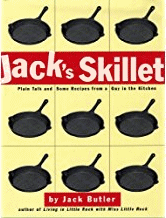 Among other things, this fictional approach allows me to treat myself as just another character, nothing special, so provides a handy check on vanity. It turns out I had rather laugh than be “important.”
Among other things, this fictional approach allows me to treat myself as just another character, nothing special, so provides a handy check on vanity. It turns out I had rather laugh than be “important.”
And it’s a natural device for me. I am a writer born and raised mostly in Delta Mississippi. I am a fascinated and somewhat skilled follower of science and mathematics. My fiction has to find a way to unite those two passionate facts. This is mostly a joke, but I do point out that the action in Nightshade does take place in the “Southern” hemisphere of Mars. And, more seriously, there is a fashion (on Mars) for the in people to pretend to be black (medicine and genetics have become very powerful)—the hypocrisy of the fashion is that they call themselves “Neonigs”—attempting to validate their own lives by attaching them to the suffering of people long dead.
A lot of explanation, and the fact is I depend on those same literary poobahs I decry to care enough to preserve the books and trace out their interconnections. That does not happen for pop authors. May not happen for me, but I can hope, and that’s enough.
![]()
